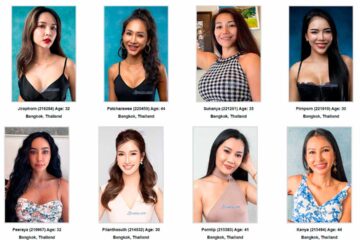EU Visa for Thai Partner
You’ve navigated the world of international dating, perhaps using services like AFA/Loveme.com or joining a romance tour, and found a wonderful connection with a woman from Thailand (learn more about Thai brides) or another Asian country (see top countries here). Now, you’re dreaming of building a life together in your home country in Europe. The biggest hurdle? Navigating the complex visa process. 🛂🇪🇺
This guide provides a comprehensive overview for European men seeking to bring their Thai or Asian fiancée or wife to Europe. We’ll cover the different types of visas, general requirements, the application process, potential costs, and common challenges when marrying a Thai woman and bringing her home.

Understanding European Visas for Family Reunification
When bringing your partner to Europe permanently, you need to distinguish between short-term visits and long-term settlement.
- Schengen Visa (Type C – Short Stay):
- Allows travel within the Schengen Area for up to 90 days in any 180-day period.
- Suitable for tourism, visiting family/friends, or potentially short trips to get married if permitted by the specific country’s rules (often requires returning home afterwards to apply for a long-stay visa).
- Not intended for permanent residence or long-term settlement.
- National Visa (Type D – Long Stay):
- Required for stays longer than 90 days for purposes like work, study, or family reunification (joining a partner/spouse).
- Issued by the specific European country where you reside and intend to live together. Rules are set nationally, though often guided by EU directives for EU member states.
- This is the primary visa type needed for your partner to move to Europe permanently.
Fiancée vs. Spousal Routes (Terminology Varies)
The exact visa names differ, but the main pathways are:
- Visa to Get Married (Fiancée Visa equivalent): Some countries (like Germany or the UK) offer a specific visa allowing your partner to enter for the purpose of getting married within a set timeframe (e.g., 3-6 months). After marriage, they typically apply for a residence permit from within the country.
- Family Reunification Visa (Spouse/Partner Visa): This is the most common route. You get married first (either in your partner’s home country, your country if she visits, or a third country like Denmark/Gibraltar known for easier marriage procedures for foreigners). After legal marriage (see marriage in Thailand info), your wife applies for this visa from her home country to join you. Some countries also recognize registered/civil partnerships for this purpose. (General visa info here).
General Visa Requirements Across Europe (Expect Variations!)
While specifics differ, most European countries require the following for family reunification visas for your Thai mail order bride:
- Proof of Genuine & Continuing Relationship: This is crucial. You’ll need substantial evidence like: photos together over time, flight tickets/stamps from visits, chat/call logs (samples), letters from friends/family, joint plans, proof of engagement/marriage. Be prepared for scrutiny and potential interviews to assess authenticity. Building a history through visits, perhaps via romance tours or independent travel (travel guide), helps demonstrate this.
- Sponsor’s Status: You (the European partner, or “sponsor”) must generally be a citizen or hold a valid long-term residence permit in the destination country.
- Sufficient Financial Means (Sponsor): You must prove you can financially support your partner (and potentially yourself) without recourse to public funds/social welfare. Income thresholds vary widely by country and sometimes region. Proof includes employment contracts, payslips, tax returns, or bank statements showing adequate savings. 💰
- Adequate Accommodation:** Proof that you have suitable housing (rented or owned) for both of you, meeting local standards for size and habitability. 🏠
- Health Insurance:** Often, proof of comprehensive health insurance coverage for your partner upon arrival is required.
- Civil Status Documents:** Your partner will need official documents like her birth certificate, passport, and proof of being single or legally divorced/widowed. If applying as a spouse, the official marriage certificate is required. These documents usually need to be officially translated and authenticated (e.g., via Apostille or embassy legalization). 📜 (Note: The linked example is for Philippines marriage, adapt search for Thai requirements).
- Integration Requirements (Country-Specific): Increasingly common. Some countries (e.g., Germany, Netherlands, Austria, sometimes France/UK) require the applicant to pass a basic language test (usually A1 level) in the national language *before* the visa is granted. Civic integration courses or exams might be required after arrival. (Do Thai girls speak English?).
- Clean Criminal Record:** The applicant usually needs to provide a police clearance certificate from their home country and possibly countries they’ve lived in previously.
The Application Process: A General Overview
The steps are broadly similar, but always follow the specific instructions from the relevant embassy/consulate:
- Identify the Correct Visa & Embassy: Determine the exact visa type needed (fiancée, spouse, etc.) for your destination country. Applications are almost always made at the embassy or consulate of your country located in your partner’s home country (e.g., Belgian Embassy in Bangkok if you live in Belgium).
- Gather Documentation: Meticulously collect all required documents for both applicant and sponsor, ensuring translations and legalizations are done correctly. This is often the most time-consuming step.
- Complete Application Form(s): Fill out the national visa application form accurately and completely.
- Schedule Appointment & Submit: Book an appointment (often online via systems like VFS Global or TLScontact, or directly with the embassy). Attend the appointment to submit the application, supporting documents, and provide biometrics (fingerprints, photo). Pay the visa fee.
- Attend Interview(s): Your partner will likely be interviewed. You, as the sponsor, might also be interviewed separately or together, either at the embassy abroad or by immigration authorities in your home country, to verify the relationship’s authenticity.
- Wait for Processing: Processing times vary wildly – from 4 weeks to 6 months or even longer is common for national visas, depending on the country and case specifics. Be patient. ⏳
- Receive Decision: If approved, your partner will usually need to submit her passport to get the visa vignette (sticker) affixed. If refused, you’ll receive a written explanation and information on appeal procedures.
- Travel & Post-Arrival Registration: Once the visa is issued, your partner can travel. Upon arrival in Europe, she will typically need to register with local authorities within a few days/weeks and apply for her formal residence permit card.
Spotlight on Key European Destinations (Check Official Sources!)
Visa rules are national competencies. Here’s a *very* general idea for some countries popular with expats (ALWAYS verify with official embassy websites):
- Germany: Requires A1 German language certificate for spouse visa *before* entry in most cases. Strict proof of finance and accommodation. Integration courses often mandatory after arrival.
- United Kingdom: Post-Brexit rules apply. Specific Fiancée or Spouse visa routes. Requires passing an approved English language test (A1/A2 level). Very strict financial requirement (£ minimum income threshold for the sponsor, currently high and subject to change).
- France: Spouse visa (VLS-TS) applied for from abroad. Requires validation and OFII medical/civic integration process after arrival. Language proficiency may be tested/required for residence permit renewal.
- Belgium: Multiple visa types (marriage, legal cohabitation). Can be complex depending on region (Flanders, Wallonia, Brussels). Strong emphasis on proving relationship duration and stability. Financial and housing checks.
- Netherlands: MVV (provisional residence permit) usually required before entry for long stay. Requires passing the Basic Civic Integration Examination Abroad (language and Dutch society knowledge) *before* applying in most cases. Strict income requirements for sponsor.
- Nordic Countries (Sweden, Norway, etc.): Generally require marriage/registered partnership first. Strong focus on relationship proof. Clear income/housing requirements for sponsor. Processing times can be long.
- Southern Europe (Spain, Italy, etc.): Processes vary. Can sometimes be slower or involve more local bureaucratic steps after arrival. Check specific consulate requirements carefully.
Potential Costs Involved (€)
Budgeting for the visa process is essential:
- Visa Application Fees: Schengen visa ≈ €80. National long-stay visas typically range from €75 – €200+, depending on the country. UK visas are significantly more expensive (£1,500+). Fees are usually non-refundable.
- Document Translation & Legalization/Apostille: Costs per document can be €20-€50+ for translation and similar or higher for official legalization/apostille. Total can easily reach €200-€600+.
- Language/Integration Tests: If required, exam fees can range from €50 – €200 per attempt.
- Travel Costs: For your partner to attend appointments/interviews at the embassy (may require travel within her country), and eventually the one-way flight for relocation (€500-€1000+). (Best time to travel?).
- Health Insurance: Initial travel/entry health insurance might cost €50-€150 for the first few months before national system integration.
- Lawyer Fees (Optional): If your case is complex or you want professional guidance, immigration lawyers can charge €1,500 – €5,000+ for full application support.
Total Estimated Visa Process Costs (excluding flights/lawyer): €500 – €1,500+ (significantly more for UK).
Common Challenges & Tips for Success
- Gather Evidence Early & Consistently: Don’t wait until you apply. Save photos, ticket stubs, chat logs, money transfer receipts (if any, be cautious), etc., throughout your relationship with your Thai girl.
- Meet Financial Requirements: This is a common reason for refusal. Know the exact income/savings threshold for your country and ensure you meet it stably.
- Be Patient & Meticulous: Bureaucracy takes time. Double-check every form and document requirement. Small errors can cause major delays.
- Be Honest and Consistent: Provide truthful information in your application and during interviews. Ensure both partners’ accounts of the relationship history align.
- Use Official Sources ONLY: While forums offer peer support, rely solely on official embassy/government websites for requirements and procedures. Information changes!
- Address Integration Early: If language tests are required, your partner should start learning well in advance.
- Beware of Scams:** Be cautious if your partner faces sudden, repeated financial “emergencies” that delay visa plans (Thai dating scam info).
Conclusion: Planning Your Future Together in Europe
Bringing your Thai or Asian partner to Europe is a significant undertaking, involving complex legal and bureaucratic processes that differ from country to country. Understanding whether you need a Schengen or National visa, the specific requirements for fiancée vs. spousal routes in your country, and meticulously preparing documentation related to your relationship, finances, and accommodation are key when dating Thai women with long-term intentions.
While challenging, thousands of couples successfully navigate this journey each year. With thorough research using official sources, careful preparation, patience, and a genuine relationship, you can look forward to building your future together in Europe. Consider if retiring in Thailand might be an alternative if the European visa process seems too daunting.
Note for US Readers: The process described here is for European countries. For bringing a partner to the United States, you would typically use the K-1 Fiancée Visa or CR-1/IR-1 Spousal Visa. Learn more about the US K-1 Visa process here.
Start Your Research Now!
Visit the official website of your country’s embassy in your partner’s home country to get the precise visa requirements and application steps.
Need help finding your partner first? Explore profiles on trusted Thai dating sites.
European Visa FAQ for Thai/Asian Partners
Can my partner apply for a long-stay visa while visiting me in Europe on a Schengen (tourist) visa?
Generally, **no**. National long-stay visas (Type D) for family reunification must almost always be applied for from the applicant’s country of residence (e.g., Thailand) before traveling to the European destination country. Applying from within the Schengen area on a tourist visa is usually not permitted, except in very specific humanitarian circumstances.
How much income do I (the sponsor) need to prove?
This varies massively by country. Some have fixed minimum income thresholds (e.g., 120-150% of social assistance levels), others assess case-by-case. It depends on your family size (just you and partner, or existing children), region, and whether income is stable. Check the official immigration authority website for your specific country – search for “family reunification income requirements.”
How long does it take to get documents like marriage certificates translated and legalized?
This depends on the document, the countries involved (issuing country and destination country), and the specific process (Apostille or multi-step legalization via Ministries and Embassies). It can take anywhere from a few days to several weeks or even months. Start this process early!
My income is slightly below the threshold. Can savings count?
Some countries allow proof of sufficient, stable savings to compensate for slightly lower income, but the rules are very specific (e.g., the amount of savings required might be substantial, or only certain types of income/savings are considered). Check your country’s specific regulations carefully.
Do we both need to attend the visa interview?
Your partner (the applicant) will almost certainly be interviewed at the embassy/consulate in her home country. Whether you (the sponsor) need to attend depends on the country and the case; sometimes sponsors are interviewed separately by immigration authorities in the European country, or not at all. Be prepared for the possibility.
Can my partner work immediately after arriving in Europe?
It depends on the specific visa type and the residence permit granted upon arrival. Often, spouses of citizens/long-term residents *are* granted the right to work relatively quickly after registering and receiving their residence permit. Fiancée visas may have restrictions until after marriage and subsequent permit application. Check the conditions tied to the specific visa/permit in your country.
Is marriage the only option, or do registered partnerships count?
Many (but not all) European countries legally recognize registered/civil partnerships and offer similar family reunification visa routes for registered partners as for married spouses. However, the partnership might need to be registered according to the laws of the European country or a country whose partnerships it recognizes. Check if your country recognizes partnerships and what the visa requirements are.
What if the visa is refused?
You will receive a formal refusal letter stating the reasons. There is usually an administrative or judicial appeal process. You can either appeal the decision (often within a specific timeframe) or address the reasons for refusal and re-apply later with a stronger application. (See general FAQ on refusals).






